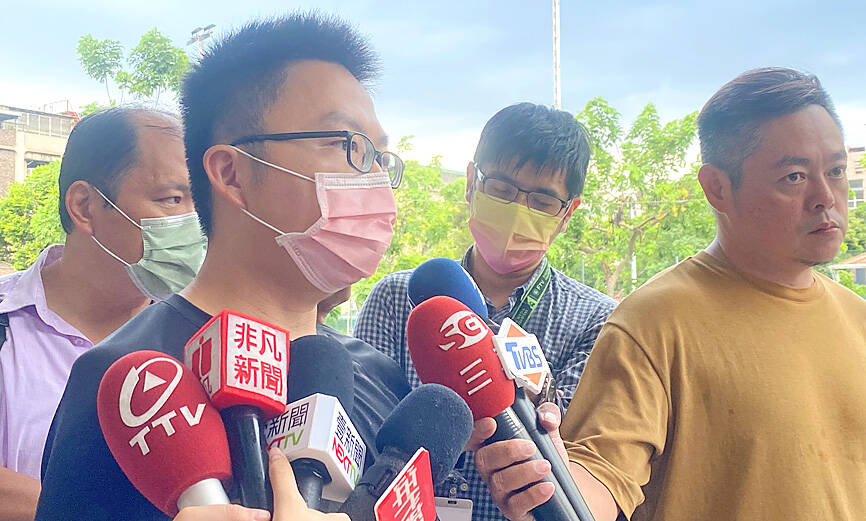The New Taipei City District Court on Friday rejected a claim for state compensation from the father of a two-year-old boy who died from complications related to COVID-19 following an 81-minute wait for an ambulance in April last year.
The court said it rejected the claim on the grounds that the plaintiff, surnamed Lin (林), had not provided medical data to establish a causal relationship between the death of the boy, nicknamed En En (恩恩), and officials’ handling of the ambulance request.
For a claim of state compensation to be established, the case should involve government officials infringing on the freedom and rights of the people through intentional or negligent actions or failure to carry out their duties, it said.

Photo: CNA
The court said it had also looked at the Control Yuan’s report on the case, in which none of the four experts consulted said the boy would have survived had the ambulance arrived on time.
Following the ruling, Lin, who had said that the delay might have factored into his son’s death, said he would work with his legal counsel to collect more evidence before filing an appeal with the High Court.
“I had nothing to lose. En En is gone, and that was my biggest loss. I didn’t win the case today, but that will in no way shake my determination to uncover the truth” behind the 81 minutes wait for an ambulance, Lin said.
En En was the first child in Taiwan to die from COVID-19, on April 19 last year. He developed severe COVID-19 symptoms and fell into a coma at home in New Taipei City’s Jhonghe District (中和) on April 14, just as COVID-19 cases in the country were beginning to surge.

Taiwan yesterday condemned the recent increase in Chinese coast guard-escorted fishing vessels operating illegally in waters around the Pratas Islands (Dongsha Islands, 東沙群島) in the South China Sea. Unusually large groupings of Chinese fishing vessels began to appear around the islands on Feb. 15, when at least six motherships and 29 smaller boats were sighted, the Coast Guard Administration (CGA) said in a news release. While CGA vessels were dispatched to expel the Chinese boats, Chinese coast guard ships trespassed into Taiwan’s restricted waters and unsuccessfully attempted to interfere, the CGA said. Due to the provocation, the CGA initiated an operation to increase

CHANGING LANDSCAPE: Many of the part-time programs for educators were no longer needed, as many teachers obtain a graduate degree before joining the workforce, experts said Taiwanese universities this year canceled 86 programs, Ministry of Education data showed, with educators attributing the closures to the nation’s low birthrate as well as shifting trends. Fifty-three of the shuttered programs were part-time postgraduate degree programs, about 62 percent of the total, the most in the past five years, the data showed. National Taiwan Normal University (NTNU) discontinued the most part-time master’s programs, at 16: chemistry, life science, earth science, physics, fine arts, music, special education, health promotion and health education, educational psychology and counseling, education, design, Chinese as a second language, library and information sciences, mechatronics engineering, history, physical education

The Chinese military has boosted its capability to fight at a high tempo using the element of surprise and new technology, the Ministry of National Defense said in the Quadrennial Defense Review (QDR) published on Monday last week. The ministry highlighted Chinese People’s Liberation Army (PLA) developments showing significant changes in Beijing’s strategy for war on Taiwan. The PLA has made significant headway in building capabilities for all-weather, multi-domain intelligence, surveillance, operational control and a joint air-sea blockade against Taiwan’s lines of communication, it said. The PLA has also improved its capabilities in direct amphibious assault operations aimed at seizing strategically important beaches,

‘MALIGN PURPOSE’: Governments around the world conduct espionage operations, but China’s is different, as its ultimate goal is annexation, a think tank head said Taiwan is facing a growing existential threat from its own people spying for China, experts said, as the government seeks to toughen measures to stop Beijing’s infiltration efforts and deter Taiwanese turncoats. While Beijing and Taipei have been spying on each other for years, experts said that espionage posed a bigger threat to Taiwan due to the risk of a Chinese attack. Taiwan’s intelligence agency said China used “diverse channels and tactics” to infiltrate the nation’s military, government agencies and pro-China organizations. The main targets were retired and active members of the military, persuaded by money, blackmail or pro-China ideology to steal